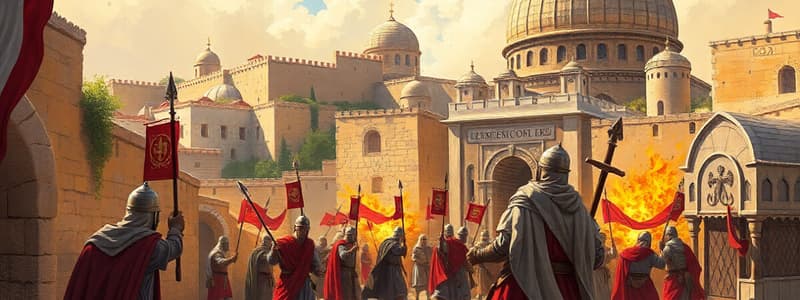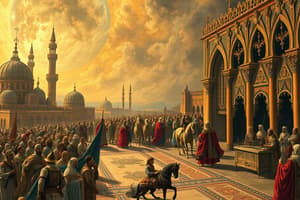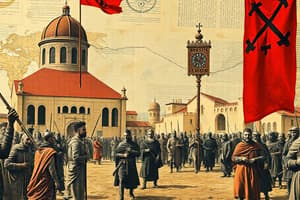Podcast
Questions and Answers
What philosophical movement emphasized individual potential during the Renaissance?
What philosophical movement emphasized individual potential during the Renaissance?
- Rationalism
- Humanism (correct)
- Empiricism
- Structuralism
Which invention by Johannes Gutenberg facilitated the spread of ideas during the Renaissance?
Which invention by Johannes Gutenberg facilitated the spread of ideas during the Renaissance?
- The steam engine
- The telescope
- The compass
- The printing press (correct)
What was the primary reason Martin Luther's 95 Theses gained significant attention?
What was the primary reason Martin Luther's 95 Theses gained significant attention?
- It criticized the selling of indulgences. (correct)
- It supported the Pope's authority.
- It promoted the Catholic Church's practices.
- It called for a return to medieval traditions.
What economic system became dominant during the Commercial Revolution?
What economic system became dominant during the Commercial Revolution?
Which Renaissance artist is known for a detailed study of the human body?
Which Renaissance artist is known for a detailed study of the human body?
What was a significant effect of the Protestant Reformation in England?
What was a significant effect of the Protestant Reformation in England?
Which of the following was NOT a notable literary work of the Renaissance?
Which of the following was NOT a notable literary work of the Renaissance?
Which concept introduced by John Calvin became influential in Protestant theology?
Which concept introduced by John Calvin became influential in Protestant theology?
What prompted Pope Urban II to call for the First Crusade?
What prompted Pope Urban II to call for the First Crusade?
Which of the following was NOT a consequence of the Crusades on Western Europe?
Which of the following was NOT a consequence of the Crusades on Western Europe?
How did the power dynamics shift in Europe as a result of the Crusades?
How did the power dynamics shift in Europe as a result of the Crusades?
What was one of the long-term cultural impacts of the Crusades on Europe?
What was one of the long-term cultural impacts of the Crusades on Europe?
The term 'God's lieutenants' refers to which concept that emerged during the rise of monarchies?
The term 'God's lieutenants' refers to which concept that emerged during the rise of monarchies?
What was a financial consequence of the Crusades for participants?
What was a financial consequence of the Crusades for participants?
Which event marked a significant break from the Catholic Church during the rise of monarchies?
Which event marked a significant break from the Catholic Church during the rise of monarchies?
Which of the following best describes the Crusaders' appearance during their campaigns?
Which of the following best describes the Crusaders' appearance during their campaigns?
Flashcards are hidden until you start studying
Study Notes
The Crusades
- Series of religious wars initiated by Christians to reclaim Jerusalem, deemed holy by Christians, Muslims, and Jews.
- Jerusalem's significance: site of Jesus' crucifixion for Christians, Muhammad's prophetic meeting for Muslims, and location of Solomon's ancient temple for Jews.
- Arabs conquered Jerusalem in 600 CE, initially allowing Christian and Jewish pilgrimages.
- By 1095, a different Arab group restricted access, prompting Pope Urban II to call for a crusade.
- Approximately 30,000 knights and soldiers, marked by red crosses, embarked on the crusade.
- After two years of hardships, Crusaders besieged Jerusalem successfully after three months of conflict.
- Most knights returned home, though some stayed to defend the city; Jerusalem was recaptured by Arabs 50 years later.
- The Crusades boosted shipbuilding, transportation, and introduced new foods, literature, art, and scientific ideas from the Arab world.
- Increased demand for exotic goods led to new trade opportunities and cultural exchanges, exposing Europeans to Islamic advancements.
- Financial burdens of involvement diminished Church power and increased authority of European monarchs.
Rise of Monarchies
- Aftermath of the Crusades saw a decline of Papal power and a rise in wealth and authority of European monarchs.
- Monarchies are systems where a single, often hereditary, individual holds executive power.
- The concept of absolute monarchy emerged, justifying authority as divinely ordained, with kings viewed as 'God's lieutenants.'
- Religious institutions lost independence, serving state interests; clergy supported monarchs for public backing.
- Example of King Henry VIII's break from Catholicism resulted in the formation of the Church of England after his annulment denial.
- The Separatists (Pilgrims) pursued religious freedom, leading to their settlement in North America aboard the Mayflower in 1620.
The Renaissance
- Renaissance, or "rebirth," originated in Italy in the late 14th century, signaling intellectual and cultural revival after the Middle Ages and Black Death.
- Era marked by advancements in philosophy, science, and arts, with humanism focusing on individual potential and personal interests.
- Johannes Gutenberg invented the printing press around 1450, revolutionizing communication and educational accessibility.
- Renaissance artists like Michelangelo and Leonardo da Vinci transitioned artistic focus from religious themes to detailed human anatomy.
- Notable literary contributions include "The Book of the Courtier" by Baldassare Castiglione and "The Prince" by Niccolò Machiavelli.
- Scientific progress led by figures such as Galileo, challenging traditional beliefs and advocating for empirical observation.
The Reformation
- Protestant Reformation in the 16th century contested the Catholic Church's authority, particularly practices like indulgence sales.
- Martin Luther's posting of the 95 Theses in 1517 ignited widespread dissent, resulting in the emergence of Protestantism.
- Further Protestant divisions emerged, including Anabaptists and followers of John Calvin, who emphasized predestination and the Protestant Work Ethic.
- In England, Henry VIII's divorce from Catherine of Aragon led to the establishment of the Church of England, creating a rift between Anglicans and Puritans and inciting religious conflict.
The Commercial Revolution
- The Commercial Revolution began in the 16th century due to the discovery and colonization of the Americas.
- Mercantilism became the prevailing economic system, where colonies catered to the interests of their mother countries.
- Transition from a local to a global economy, prioritizing production for profit rather than mere survival.
- The rise of banks enhanced trade and economic expansion but also contributed to inflation and growing wealth disparity.
Studying That Suits You
Use AI to generate personalized quizzes and flashcards to suit your learning preferences.





